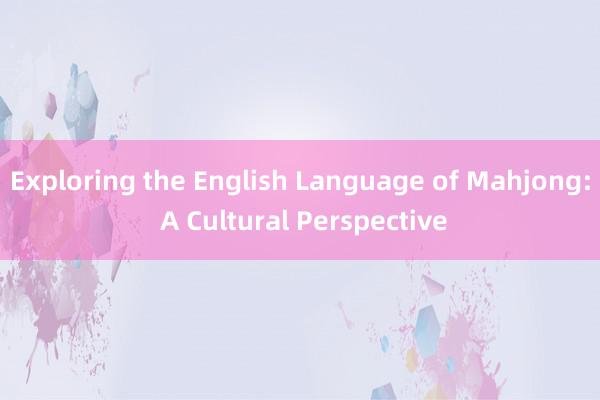
### Exploring the English Language of Mahjong: A Cultural Perspective
企企达信有限公司Mahjong, often referred to as "Majong" or "Mah-Jongg" in English-speaking countries, is not just a game; it's a cultural phenomenon that has transcended geographical boundaries and languages to become a global pastime. Originating in China during the late Qing dynasty, this strategic tile-based game has evolved into a multifaceted cultural expression, deeply rooted in Chinese history, philosophy, and social dynamics. The exploration of its English language representation reveals a rich tapestry of cultural adaptation and preservation.
#### Historical Context and Evolution
The English language adoption of Mahjong reflects the game's journey from its Chinese origins to its global popularity. Initially, Mahjong was introduced to Western audiences through various translations and adaptations, each attempt to capture the essence of the game while accommodating linguistic and cultural nuances. The game's name itself underwent several transformations, from "Majong" in the early 20th century to "Mah-Jongg" in the United States, 德钦人才网_德钦招聘网_德钦人才招聘网 which was influenced by the phonetic pronunciation of Chinese characters in English. These variations highlight the challenge of translating culturally specific concepts and maintaining their original meaning in a foreign language.
#### Cultural Significance and Adaptation
In English-speaking cultures, 伏魔迷失 Mahjong has been adapted to fit local contexts and norms. For instance,山东凯斯特石油化工有限公司 the rules and strategies might differ slightly from the traditional Chinese versions, reflecting a blend of cultural influences. The game's adoption also serves as a bridge for cultural exchange,武汉科利大信有限公司 allowing players from diverse backgrounds to engage with each other through a common interest. This cross-cultural interaction enriches the game's experience, making it more than just a competitive activity but also a means of learning about different cultures and histories.
#### Global Impact and Representation
As Mahjong gained international recognition, its English language representation became a reflection of broader global cultural trends. Online platforms and mobile applications have played a significant role in popularizing the game globally, offering tutorials, forums, and even virtual Mahjong clubs where players can learn and play the game. These digital spaces not only facilitate gameplay but also serve as platforms for cultural exchange, where players from around the world can discuss strategies, share experiences, and learn about the game's cultural significance.
#### Conclusion
The English language representation of Mahjong is a testament to the game's ability to transcend cultural barriers and adapt to new environments. It is a dynamic cultural artifact that continues to evolve武汉科利大信有限公司, reflecting both its historical roots and contemporary global interactions. Through its various translations and adaptations, Mahjong remains a symbol of cultural exchange, unity, and diversity, showcasing the universal appeal of games as a means of fostering human connection across linguistic and cultural divides.